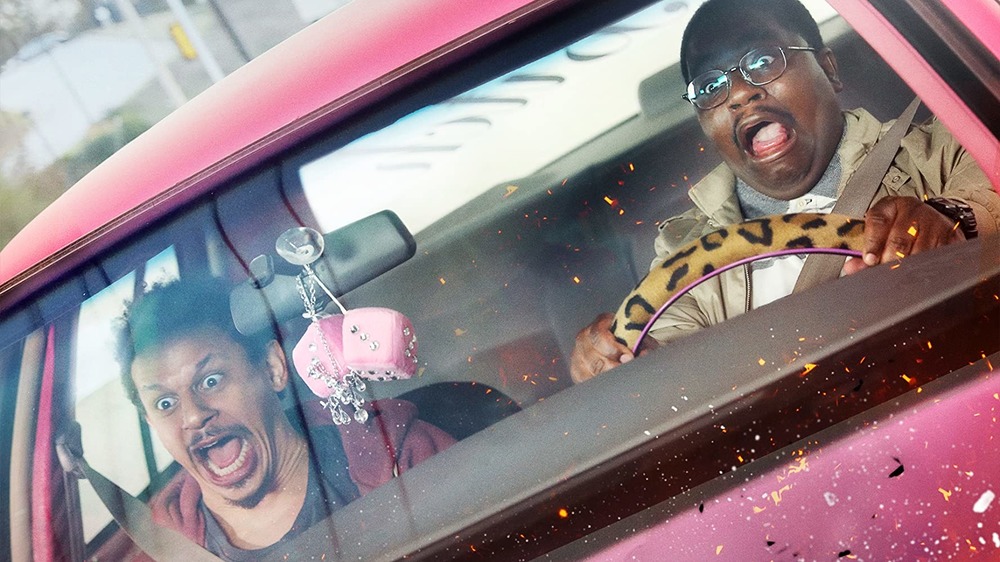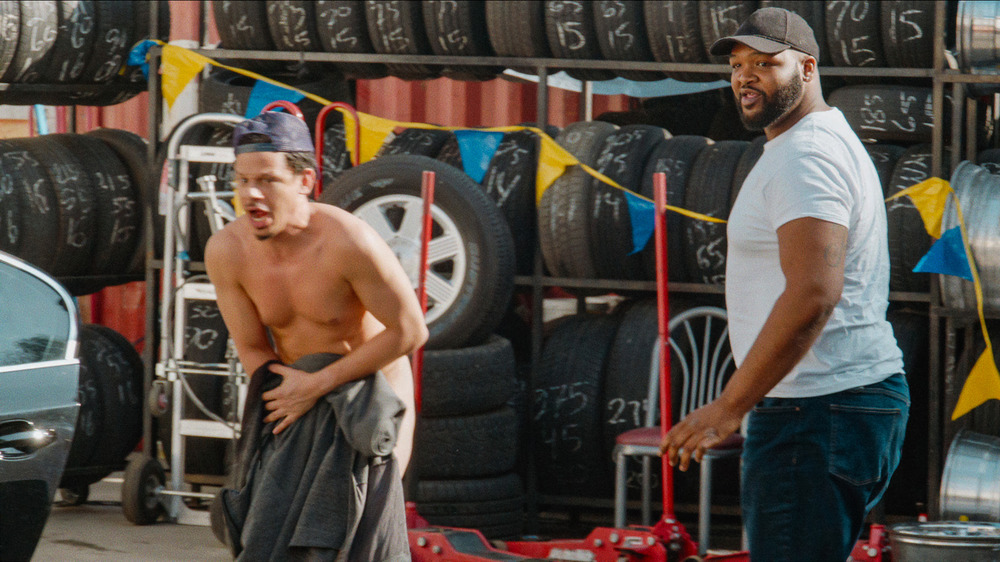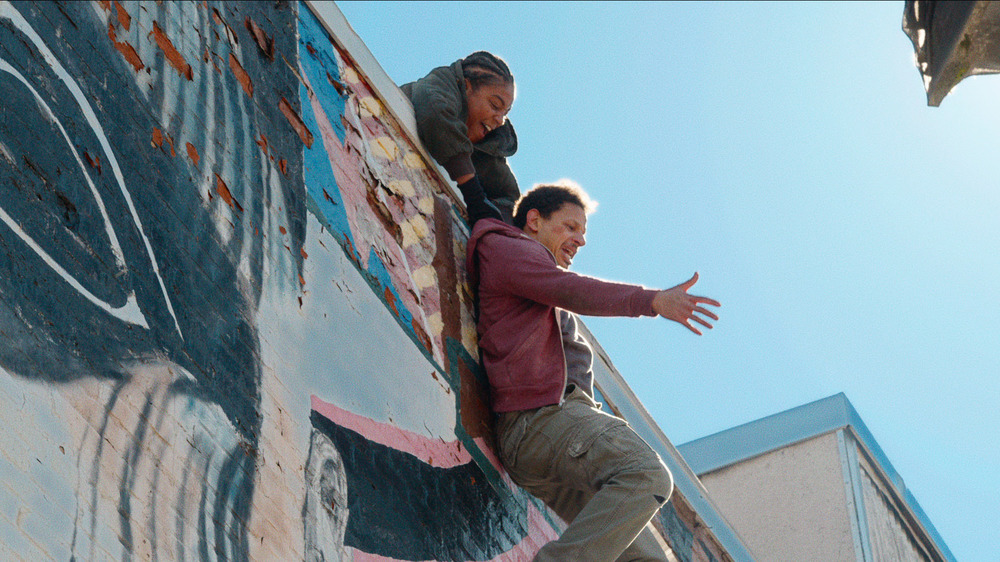Bad Trip Review: A Sugar Rush With A Sweet Core
It takes a very specific kind of performer to anchor a truly effective hidden camera comedy. The Borat films had Sacha Baron Cohen. Bad Grandpa had Jackass veteran Johnny Knoxville. Lucky for Bad Trip, the new Netflix comedy produced by Jackass co-creator Jeff Tremaine, someone as elastic and singular as Eric André exists to carry this ambitious and raucous film on his shoulders. Alongside Lil Rel Howery and Tiffany Haddish, Andre splits his screen time between playing a genuinely compelling character within this insane paradigm while performing excessive Looney Tunes-style bits involving unassuming bystanders.
Bad Trip works best when it functions like a warped reflection of the falseness inherent to modern mainstream comedy tropes that still holds its own in terms of pure shock value in its vulgar pranks. After having been leaked prematurely a full calendar year ago, it's now available (legally) on Netflix, a platform largely populated by exactly the kind of unrealistic laffers the studio system has been churning out forever. Seeing the juxtaposition between this movie and the other jokey flicks it's lampooning when scrolling between algorithmically suggested viewing options makes the final product all the more effective.
Sure, Bad Trip is, admittedly, a concept movie whose one joke would wear thin if it lasted any longer than its tight 84 minutes. But at this length, with this sustained intensity, that straightforward shtick reaps serious dividends.
Doing it for the bit
The central premise of Bad Trip is as standard as they come. André plays Chris Carey, a thirtysomething slacker who has worked at his local mall since high school. After running into an old crush from those teenage days (Michaela Conlin), Chris ropes his best friend Bud Malone (Howery) into a Ferris Bueller-esque scheme to steal Bud's sister's car to drive to New York City to make a big declaration to his unrequited love. But Bud's sister Trina (Haddish) is an absolute menace who breaks out of jail, finds her prized possession missing, and steals a cop car to chase them up the highways of America.
The basic framework is, beat for beat, so similar to so many interchangeable road trip comedies with an artificial romance at their core. But it's the "hidden camera" element that makes it special.
It's as if André, director Kitao Sakurai, and co-writer Dan Curry laid out all the index cards of basic scene ideas on a table and conjured awkward and daring ways to shoot each individual one, including basic levels of improvisation by making all of the one-note background players usually seen for brief moments in mainstream comedies actual, regular folk. So instead of getting a seasoned character actor to play the one-scene role of the old Black man on a bench whose random wisdom sets Chris on his journey, they just use a random old Black man who doesn't know he's interacting with a living piece of fiction.
When Chris and Bud take Trina's car, the car is parked in a real impound lot, so the attendant who signs it out to them is the same man who experiences Trina's absurd wrath when she breaks out of prison. In that earlier prison escape sequence, a normal guy removing some street graffiti is the first person to see Trina hiding under a bus, and his real reactions to this situation, despite somehow not recognizing Haddish, completely trump whatever tired gags some UCB alum would have injected into the throwaway part.
It's a goofy conceit, sure, but it breathes new life into the scenarios audiences have grown numb to over the years, adding a much-needed burst of chaos into the film's deliberately milquetoast narrative. A handful of the pranks themselves push just far enough past the line for decency to question the entire affair. Namely a pair of scenes when Chris gets raped (twice) by a man in a suit posing as a gorilla at the zoo and another involving Chris and Bud, having their respective penises trapped at opposing ends of some Chinese finger cuffs, attempting to escape their predicament inside, you guessed it, an actual Chinese restaurant.
But those unflinching outliers are mainly there to push the envelope and highlight the embedded silliness all the movies they're aping have baked into their very DNA. On a surface level, every movie viewer can recognize how saccharine and forced the average rom-com makes depicting the flutters of love feel. It's just not until they see André performing a La La Land-esque musical number by himself at the mall in front of the entire food court that they can truly feel how uncomfortable such antics would be IRL and not on the big screen.
(They're also not afraid to get very specific with their parody, as seen in the wonderful payoff to recurring gags surrounding the Wayans brothers classic White Chicks.)
That said, there's an even sweeter reason this high concept works as well as it does.
Perspective is everything
On their own, movies built around getting one over on random people just walking around and minding their business get real old, real fast. It's incredibly difficult to perform these cinematic pranks in a way that isn't mean-spirited or grotesque in the sheer audacity of their exploitation.
In Bad Trip, however, the prankees are rarely the butt of the joke, with most of the embarrassment being focused on Andre's Chris, who does the Daffy Duck-iest bumps and flails in his attempts to discomfort and surprise both the viewer and his unsuspecting co-stars. Both Haddish and he have an uncanny ability throughout the film to inject immense chaotic energy into otherwise bland scene prompts, but André in particular takes the formula Cohen so perfected as Borat and turns it up several notches.
See, Borat is a complete cartoon in the sense that there is so little about him that feels realistic. But Chris, as a construct, is a delicate mixture of clueless naïveté and surreal mischief made flesh. The scenes aren't designed to just mess with the subjects, but to push the format of the modern comedic vehicle to its most disturbing and logical conclusion: a gross and unruly mess of violence, buffoonery, and spectacle.
But in a surprising twist, Bad Trip, in the end, isn't the indictment of contemporary escapism it may sound like from description alone. It skewers the living hell out of a type of movie that hasn't usefully evolved in decades, sure. But it's not poking mean-spirited fun at the sort of people that smile so widely at the uplifting, if patently false, moments we've all grown so accustomed to waiting for when watching a comedy.
Some of the best laughs in the movie come from the subversion of expectations that come with replacing actors with blissfully unaware real individuals. There's a great scene when Chris asks a woman to help jumpstart Trina's car, and when he tries to blame her for electrocuting him, her righteous indignation plays so much funnier than any equally fictional bit player could have conjured.
But it's not the laughs that make Bad Trip feel almost transcendent. It's in the sincere and moving interactions the movie's fictional characters have with their real-life scene partners. Whether it's a guy just waiting for his car to be washed earnestly trying to play wingman for Chris or a kind waitress giving Chris and Bud genuine romantic advice, the movie makes up for its gross-out humor with expertly captured observations of the undeniable goodness in people.
A climax when Trina dangles Chris over the edge of a roof attracts a crowd outside of a food truck gawking and filming on their cell phones, but it also highlights people within the mob trying desperately to talk her out of murdering this man they don't even know.
Perhaps no moment encapsulates this better than Chris and Bud's obligatory make-up scene after the lifelong best friends have a second act fallout. It takes place on a bus full of normal passengers, and seeing one woman in particular react the way she might have as an audience member watching this movie onscreen brings the entire metatextual experiment full circle.
Bad Trip is a wild movie and it easily could have been a deeply cynical exercise in sending up the most repetitive and groan-worthy elements of Hollywood psychology. But instead, it winds up strangely touching and reassuring, the way good comedies ought to be.


